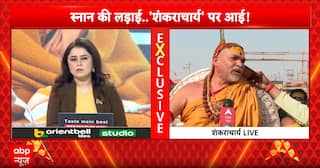Explorer
Vinod Khanna: From films to politics via Osho ashram

Vinod Khanna
Actor Vinod Khanna had money, glamour and fame but the “sexy sanyasi” largely remained restless till he joined politics.
Khanna’s entry in politics was dramatic. He joined the Bharatiya Janata Party (BJP) in December 1997 and on the very day of his joining, he was asked to contest from Gurdaspur for the February 1998 Lok Sabha election. Khanna was taken aback. He later told an interviewer, “I didn't even know where Gurdaspur was! But I put my heart and soul into my constituency.’
Khanna’s film career from 1969 to 1980 was flamboyant. At the height of success, he courted many controversies and was linked to top actresses of that era. He became the only Bollywood hero to forsake fame and success.
After a long string of hits in 1977-1978, Khanna had established himself as a formidable challenger to Amitabh Bachchan in the superstar sweepstakes, but he shocked filmdom and the public when in 1980 he announced his retirement and chose instead to embark upon a quest for spiritual fulfilment. In many multi-star films such as Parvarish (1977), Hera Pheri (1976), Khoon Pasina (1977) and Amar Akbar Anthony (1977) with Amitabh, Khanna was reportedly paid more than Amitabh.
But money, glamour and fame did not attract Khanna. He turned spiritual and got attracted to Osho alias Bhagwan Rajneesh. Initially, he would visit Osho’s ashram in Pune every weekend but soon he announced his retirement from films when he was at his peak. Few believed him. He was clled “sexy- sanyasi”.
For Khanna, spirituality was about gaining mastery over the mind and body. For the next four years, he stayed with Osho in Rajneeshpuram in Oregon. Khanna was Osho’s gardener, often cleaning toilets and doing dishes.
By the time Khanna returned to India and films, Amitabh was not only an established superstar but had dabbled in politics too. By 1987, Amitabh had complained of unease and lack of affinity with politics, dumping Parliament and his childhood friend Rajiv Gandhi during the Bofors controversy.
That estrangement symbolised Rajiv's downfall. It was VP Singh's 1988 Lok Sabha by-election win from Allahabad --- the seat Amitabh had resigned --- that galvanised a fragmented Opposition, spurring it to unite and humble the Congress in the following year's general election.
In contrast, Khanna remained low-key in the political arena from December 1997 till death even though he, along with Shatrughan Sinha became first set of Hindi cinema superstars to become Union Ministers. In July 2002, Atal Bihari Vajpayee made Khanna Union Minister of State for Culture and Tourism. Later he served a stint in the Ministry of External Affairs.
Khanna remained active in the Film and Television Institute (FTII) for four years between October 2001 and March 2005. The UPA under Manmohan Singh acknowledged Khanna’s contribution and permitted him to continue heading the general council of FTII, a year after the BJP-led NDA Government lost power in the 2004.
When actor Gajendra Chouhan faced protests as FTII director, agitating FTII students had cited Khanna’s stint with the institute to drive home the point to the Information and Broadcasting Ministry officials that they were not against a member having strong political leanings as FTII head if his credentials were good.
Khanna had told an interviewer in 1998 that he joined the BJP as he was a believer in Hindutva philosophy. "I felt it was the right time and the right party to contest the election," Khanna had said then, dispelling the notion that Shatrughan Sinha, who was already a BJP MP, had played a role in drafting him in the BJP. While Sinha turned a dissident during Narendra Modi era, Khanna remained a low-key, loyal soldier. He used to often say, “My party’s agenda is my agenda."
Khanna helped the BJP oust three time Lok Sabha member Sukhbans Kaur Bhinder, wife of PS Bhinder, a former DIG with Delhi Police during the Emergency who was considered Sanjay Gandhi’s henchman. Sukhbans was the only woman in the country to have become Member of Parliament six times -- five times of the Lok Sabha and once of the Rajya Sabha.
In his first election campaign, Khanna promised to turn otherwise backward Gurdaspur which shares its border with Pakistan, into Paris. The Congress had described Khanna as "a star that appears by night and vanishes at day."
In spite of an 'outsider' tag, Khanna won from Gurdaspur in 1998, 1999, 2004 and 2014. The only occasion he tasted electoral defeat was in 2009 when Khanna lost to Pratap Singh Bajwa. Khanna however, avenged the defeat in 2014.
(Rasheed Kidwai is the Associate Editor with The Telegraph. His Twitter handle is: @rasheedkidwai)
Disclaimer: The opinions, beliefs and views expressed by the various authors and forum participants on this website are personal and do not reflect the opinions, beliefs and views of ABP News Network Pvt Ltd.
Follow Blog News on ABP Live for more latest stories and trending topics. Watch breaking news and top headlines online on ABP News LIVE TV
View More




























